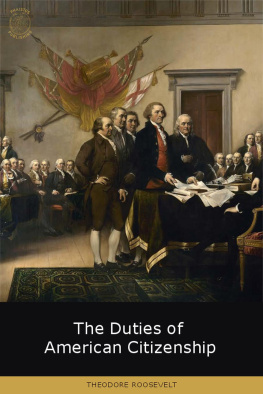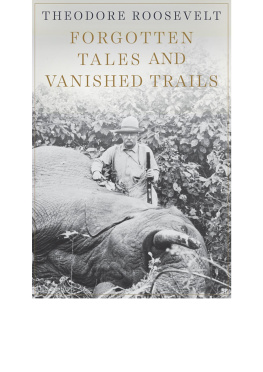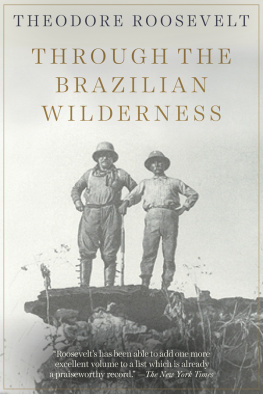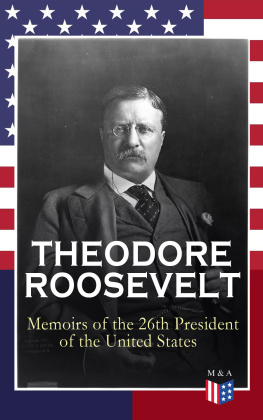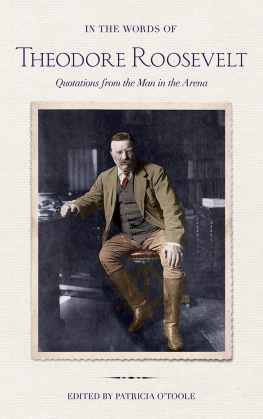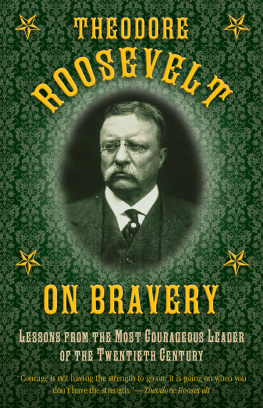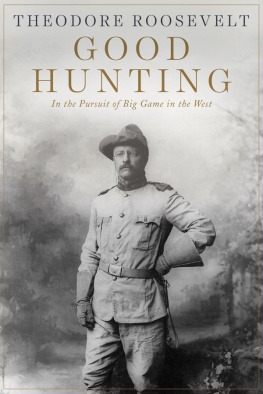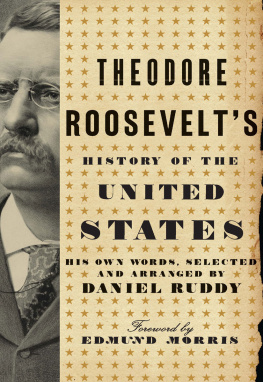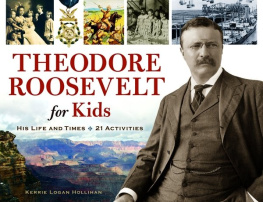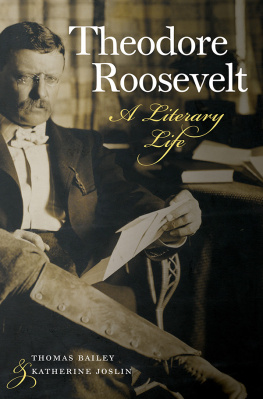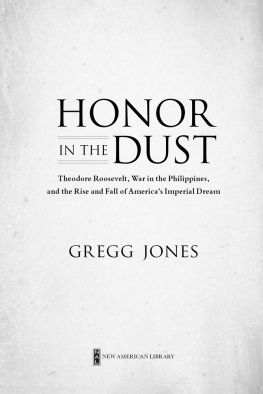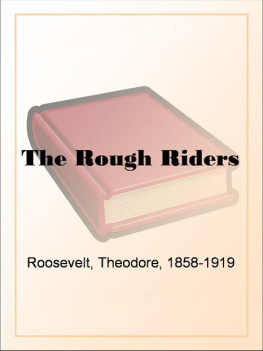Theodore Roosevelt - The Duties of American Citizenship
Here you can read online Theodore Roosevelt - The Duties of American Citizenship full text of the book (entire story) in english for free. Download pdf and epub, get meaning, cover and reviews about this ebook. year: 2018, publisher: Charles River Editors, genre: Science. Description of the work, (preface) as well as reviews are available. Best literature library LitArk.com created for fans of good reading and offers a wide selection of genres:
Romance novel
Science fiction
Adventure
Detective
Science
History
Home and family
Prose
Art
Politics
Computer
Non-fiction
Religion
Business
Children
Humor
Choose a favorite category and find really read worthwhile books. Enjoy immersion in the world of imagination, feel the emotions of the characters or learn something new for yourself, make an fascinating discovery.
- Book:The Duties of American Citizenship
- Author:
- Publisher:Charles River Editors
- Genre:
- Year:2018
- Rating:5 / 5
- Favourites:Add to favourites
- Your mark:
- 100
- 1
- 2
- 3
- 4
- 5
The Duties of American Citizenship: summary, description and annotation
We offer to read an annotation, description, summary or preface (depends on what the author of the book "The Duties of American Citizenship" wrote himself). If you haven't found the necessary information about the book — write in the comments, we will try to find it.
The Duties of American Citizenship is one of Theodore Roosevelts classic speeches.
The Duties of American Citizenship — read online for free the complete book (whole text) full work
Below is the text of the book, divided by pages. System saving the place of the last page read, allows you to conveniently read the book "The Duties of American Citizenship" online for free, without having to search again every time where you left off. Put a bookmark, and you can go to the page where you finished reading at any time.
Font size:
Interval:
Bookmark:
The Duties of American Citizenship
By Theodore Roosevelt
2018 Phaistos Publishers
Of course, in one sense, the first essential for a man's being a good citizen is his possession of the home virtues of which we think when we call a man by the emphatic adjective of manly. No man can be a good citizen who is not a good husband and a good father, who is not honest in his dealings with other men and women, faithful to his friends and fearless in the presence of his foes, who has not got a sound heart, a sound mind, and a sound body; exactly as no amount of attention to civil duties will save a nation if the domestic life is undermined, or there is lack of the rude military virtues which alone can assure a country's position in the world. In a free republic the ideal citizen must be one willing and able to take arms for the defense of the flag, exactly as the ideal citizen must be the father of many healthy children. A race must be strong and vigorous; it must be a race of good fighters and good breeders, else its wisdom will come to naught and its virtue be ineffective; and no sweetness and delicacy, no love for and appreciation of beauty in art or literature, no capacity for building up material prosperity can possibly atone for the lack of the great virile virtues.
But this is aside from my subject, for what I wish to talk of is the attitude of the American citizen in civic life. It ought to be axiomatic in this country that every man must devote a reasonable share of his time to doing his duty in the Political life of the community. No man has a right to shirk his political duties under whatever plea of pleasure or business; and while such shirking may be pardoned in those of small cleans it is entirely unpardonable in those among whom it is most commonin the people whose circumstances give them freedom in the struggle for life. In so far as the community grows to think rightly, it will likewise grow to regard the young man of means who shirks his duty to the State in time of peace as being only one degree worse than the man who thus shirks it in time of war. A great many of our men in business, or of our young men who are bent on enjoying life (as they have a perfect right to do if only they do not sacrifice other things to enjoyment), rather plume themselves upon being good citizens if they even vote; yet voting is the very least of their duties, Nothing worth gaining is ever gained without effort. You can no more have freedom without striving and suffering for it than you can win success as a banker or a lawyer without labor and effort, without self-denial in youth and the display of a ready and alert intelligence in middle age. The people who say that they have not time to attend to politics are simply saying that they are unfit to live in a free community. Their place is under a despotism; or if they are content to do nothing but vote, you can take despotism tempered by an occasional plebiscite, like that of the second Napoleon. In one of Lowell's magnificent stanzas about the Civil War he speaks of the fact which his countrymen were then learning, that freedom is not a gift that tarries long in the hands of cowards: nor yet does it tarry long in the hands of the sluggard and the idler, in the hands of the man so much absorbed in the pursuit of pleasure or in the pursuit of gain, or so much wrapped up in his own easy home life as to be unable to take his part in the rough struggle with his fellow men for political supremacy. If freedom is worth having, if the right of self-government is a valuable right, then the one and the other must be retained exactly as our forefathers acquired them, by labor, and especially by labor in organization, that is in combination with our fellows who have the same interests and the same principles. We should not accept the excuse of the business man who attributed his failure to the fact that his social duties were so pleasant and engrossing that he had no time left for work in his office; nor would we pay much heed to his further statement that he did not like business anyhow because he thought the morals of the business community by no means what they should be, and saw that the great successes were most often won by men of the Jay Gould stamp. It is just the same way with politics. It makes one feel half angry and half amused, and wholly contemptuous, to find men of high business or social standing in the community saying that they really have not got time to go to ward meetings, to organize political clubs, and to take a personal share in all the important details of practical politics; men who further urge against their going the fact that they think the condition of political morality low, and are afraid that they may be required to do what is not right if they go into politics.
The first duty of an American citizen, then, is that he shall work in politics; his second duty is that he shall do that work in a practical manner; and his third is that it shall be done in accord with the highest principles of honor and justice. Of course, it is not possible to define rigidly just the way in which the work shall be made practical. Each man's individual temper and convictions must be taken into account. To a certain extent his work must be done in accordance with his individual beliefs and theories of right and wrong. To a yet greater extent it must be done in combination with others, he yielding or modifying certain of his own theories and beliefs so as to enable him to stand on a common ground with his fellows, who have likewise yielded or modified certain of their theories and beliefs. There is no need of dogmatizing about independence on the one hand or party allegiance on the other. There are occasions when it may be the highest duty of any man to act outside of parties and against the one with which he has himself been hitherto identified; and there may be many more occasions when his highest duty is to sacrifice some of his own cherished opinions for the sake of the success of the party which he on the whole believes to be right. I do not think that the average citizen, at least in one of our great cities, can very well manage to support his own party all the time on every issue, local and otherwise; at any rate if he can do so he has been more fortunately placed than I have been. On the other hand, I am fully convinced that to do the best work people must be organized; and of course an organization is really a party, whether it be a great organization covering the whole nation and numbering its millions of adherents, or an association of citizens in a particular locality, banded together to win a certain specific victory, as, for instance, that of municipal reform. Somebody has said that a racing-yacht, like a good rifle, is a bundle of incompatibilities; that you must get the utmost possible sail power without sacrificing some other quality if you really do get the utmost sail power, that, in short you have got to make more or less of a compromise on each in order to acquire the dozen things needful; but, of course, in making this compromise you must be very careful for the sake of something unimportant not to sacrifice any of the great principles of successful naval architecture. Well, it is about so with a man's political work. He has got to preserve his independence on the one hand; and on the other, unless he wishes to be a wholly ineffective crank, he has got to have some sense of party allegiance and party responsibility, and he has got to realize that in any given exigency it may be a matter of duty to sacrifice one quality, or it may be a matter of duty to sacrifice the other.
If it is difficult to lay down any fixed rules for party action in the abstract; it would, of course, be wholly impossible to lay them down for party action in the concrete, with reference to the organizations of the present day. I think that we ought to be broad-minded enough to recognize the fact that a good citizen, striving with fearlessness, honesty, and common sense to do his best for the nation, can render service to it in many different ways, and by connection with many different organizations. It is well for a man if he is able conscientiously to feel that his views on the great questions of the day, on such questions as the tariff, finance, immigration, the regulation of the liquor traffic, and others like them, are such as to put him in accord with the bulk of those of his fellow citizens who compose one of the greatest parties: but it is perfectly supposable that he may feel so strongly for or against certain principles held by one party, or certain principles held by the other, that he is unable to give his full adherence to either. In such a case I feel that he has no right to plead this lack of agreement with either party as an excuse for refraining from active political work prior to election. It will, of course, bar him from the primaries of the two leading parties, and preclude him from doing his share in organizing their management; but, unless he is very unfortunate, he can surely find a number of men who are in the same position as himself and who agree with him on some specific piece of political work, and they can turn in practically and effectively long before election to try to do this new piece of work in a practical manner. One seemingly very necessary caution to utter is, that a man who goes into politics should not expect to reform everything right off, with a jump. I know many excellent young men who, when awakened to the fact that they have neglected their political duties, feel an immediate impulse to form themselves into an organization which shall forthwith purify politics everywhere, national, State, and city alike; and I know of a man who having gone round once to a primary, and having, of course, been unable to accomplish anything in a place where he knew no one and could not combine with anyone, returned saying it was quite useless for a good citizen to try to accomplish anything in such a manner. To these too hopeful or too easily discouraged people I always feel like reading Artemus Ward's article upon the people of his town who came together in a meeting to resolve that the town should support the Union and the Civil War, but were unwilling to take any part in putting down the rebellion unless they could go as brigadier-generals. After the battle of Bull Run there were a good many hundreds of thousands of young men in the North who felt it to be their duty to enter the Northern armies; but no one of them who possessed much intelligence expected to take high place at the outset, or anticipated that individual action would be of decisive importance in any given campaign. He went in as private or sergeant, lieutenant or captain, as the case might be, and did his duty in his company, in his regiment, after a while in his brigade. When Ball's Bluff and Bull Run succeeded the utter failure of the Peninsular campaign, when the terrible defeat of Fredericksburg was followed by the scarcely less disastrous day at Chancellorsville he did not announce (if he had any pluck or manliness about him) that he considered it quite useless for any self-respecting citizen to enter the Army of the Potomac, because he really was not of much weight in its councils, and did not approve of its management; he simply gritted his teeth and went doggedly on with his duty, grieving over, but not disheartened at the innumerable shortcomings and follies committed by those who helped to guide the destinies of the army, recognizing also the bravery, the patience, intelligence, and resolution with which other men in high places offset the follies and shortcomings and persevering with equal mind through triumph and defeat until finally he saw the tide of failure turn at Gettysburg and the full flood of victory come with Appomattox.
Next pageFont size:
Interval:
Bookmark:
Similar books «The Duties of American Citizenship»
Look at similar books to The Duties of American Citizenship. We have selected literature similar in name and meaning in the hope of providing readers with more options to find new, interesting, not yet read works.
Discussion, reviews of the book The Duties of American Citizenship and just readers' own opinions. Leave your comments, write what you think about the work, its meaning or the main characters. Specify what exactly you liked and what you didn't like, and why you think so.

